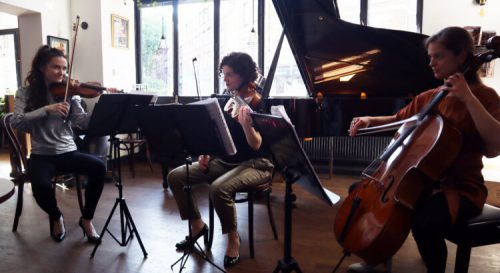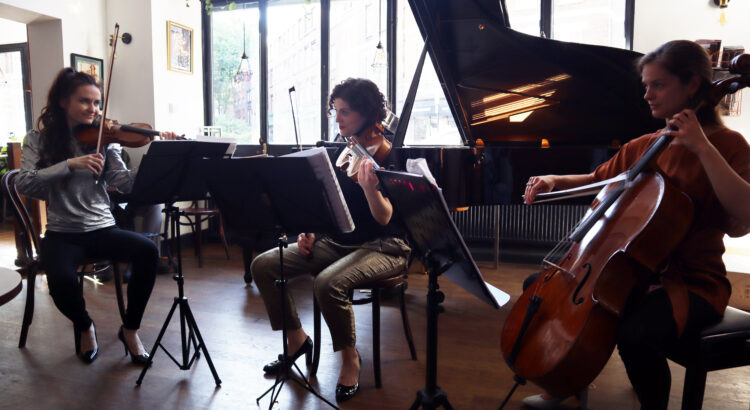 United Kingdom Up Close and Musical – Klein, Bach, Shaw: Trio Klein (Kamila Bydlkowska [violin], Shiry Rashkovsky [viola], Ella Rundle [cello]) with Huw Watkins (piano). Fidelio Orchestra Café, Clerkenwell, London, 17.7.2021. (CC)
United Kingdom Up Close and Musical – Klein, Bach, Shaw: Trio Klein (Kamila Bydlkowska [violin], Shiry Rashkovsky [viola], Ella Rundle [cello]) with Huw Watkins (piano). Fidelio Orchestra Café, Clerkenwell, London, 17.7.2021. (CC)

Bach – Goldberg Variations (arr. Sitkovetsky. selection)
Gideon Klein – String Trio
Caroline Shaw – Thousandth Orange
This was the first in a series of concerts in the twice delayed Up Close and Musical festival held at the atmospheric Fidelio Café in Clerkenwell. Covid was the culprit for the delays of course; but the best things come to those who wait. The Artistic Director is the viola player Shiry Rashkovsky. Guests in future concerts (see link at the end of the review) include Abel Selaocoe (cello), Chloë Hanslip (violin), Misha Mullov-Abbado (jazz bass) and Héloïse Werner (soprano). The festival has been twice rescheduled, so to see it come to fruition was triply satisfying. The format is a concert of about an hour’s duration at 6pm (including introductions to the pieces, interviews and questions from the floor) followed by dinner (fabulously cooked, incidentally) and then, for those younger than I, a DJ set downstairs in the basement. Chats about the music and related matters are hosted by Rashkovsky.

The advertised order seemed to be Bach/Klein/Shaw but in the end it was the Gideon Klein that started the concert. Klein’s life was tragically cut short (his dates are 1919-45); he was one of several composers who were incarcerated at the Nazi’s Theresienstadt (Terezín) camp, a ‘showcase’ to show the world that there was ‘good’ involved in these atrocities. In October 1944, Klein was taken to Auschwitz and thence to Frühlingsgrube – his String Trio was completed shortly before that move. It is in proto-minimalist fashion, buzzing with energy. The acoustic was well judged by the Trio Klein – even sitting very close there was no sense of overload. The first movement held within it dance, and most importantly, hope. It is the work of a young man (Klein was mid-twenties when he wrote it) and at its heart it holds a set of variations on a Moravian folk song (‘Variance na téma moravské lidové pisné’), here expressive and often warm-toned. The brief finale is a fast and lively dance. Performed with joy.
The Sitkovetsky arrangement of the Bach Goldberg Variations is in itself a little miracle. Back in September last year, as the world tentatively started to open up, the Manchester Collective presented a selection at Leeds Town Hall (review click here). And while both that and the Trio Klein’s performances were merely excerpts, there remains a sense of the transcendental about this. For the Trio Klein performance, variations were carefully chosen, from the dancing to the majestic to the reflective. Sitkovetsky’s arrangement is masterly – and a real boon to the repertoire of the string trio – and how gorgeous to hear three absolutely equal voices in the performance. Bass-led counterpoint, strongly initiated by Ella Rindle in Variatio X (‘Fughetta’), was a joy, while the Trio Klein’s way with ornaments in Variatio II against a walking bass was superbly wrought. A wonderful experience, the youth of the performers bringing out the sheer exhilaration of invention in Bach’s timeless score.
Finally, a piece by Caroline Shaw: Thousandth Orange (2018) for piano quartet. Pianist Huw Watkins, replacing the originally advertised Yulia Chaplina, began the piece with a four-chord progression that seems to refer to the harmonies of Philip Glass. Shaw’s idea is that this progression is ‘Nothing fancy. Nothing extravagant. Just something quite beautiful and everyday, that is enjoyed and loved and consumed and forgotten’. Inspirations for this piece run from Brahms’s piano quartets to still life paintings, in which repetition illuminates rather than dulls (think Van Gogh’s revisiting of sunflowers or Caravaggio’s fruit). As Shaw puts it, ‘Thousandth Orange is about these tiny oblique revelations that time’s filter can open up in a musical memory. The title also suggests a thousand different shades of the colour orange, or the image of a thousand oranges, or perhaps a thousand ways of looking at an orange’. The piece is fascinating from this perspective (or should that be perspectives?). I wonder if the strings’ deliberately dissonant, discombobulatory response to the piano in the opening measures represents an immediate skewing of memory – once the chordal sequence is established, after all, it becomes a reference point that can be either called from memory, or even taken for a walk through a fairground mirror. When the piano, later, plays the sequence but higher up in its register, the effect is curiously pure; the string response to that is a much more Romantic build-up. Food for thought, presented via a positively mesmeric performance.
Caroline Shaw, in 2013, was the youngest person ever to win the Pulitzer Prize for music. She not only has something to say, but she also knows how to say it via the most expressive, compact means. A remarkable piece, and the perfect way to close an hour’s worth of beautiful, thought-provoking music.
The festival continues on 29 July, when genre-defying cellist Abel Selaocoe brings his unique musical voice to works by Dall’Abaco, J S Bach and Marin Marais, juxtaposed with melodies and improvisations on folk themes from South Africa.
Colin Clarke
For more about Up Close and Musical click here.
